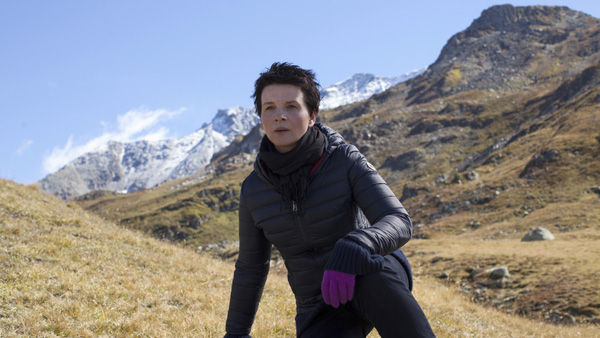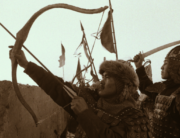My last screening at this year’s Cannes Film Festival, the 34th in eight days, was a rewarding way to wind down, ending the festival on a rich, resonating note. Director and writer Olivier Assayas smoothly makes his first (mostly) English language foray, buoyed by the strong performance of Juliette Binoche.
While Assayas’s new film has been described as All About Eve redux, it’s not as sinister or vicious, though it does involve a star actress aging out of roles and realizing that the spotlight has shifted to a flavor-of-the-month. Yet there is no backstabbing here—just (surprise, surprise)—two actresses with different points of view who agree to collaborate, however awkwardly. Adjustment of perspective, yes. Catfights, no. As a result, the director has written a rich role of a reluctant and ruefully wise observer of time. Cue the score for Der Rosenkavalier.
What also sets the film apart is that its lead protagonist isn’t all-out neurotic and pathetic. (For an example of that, see Julianne Moore’s fading movie star in Map to the Stars, which won Moore the best actress prize this year.) Clouds of Sils Maria also lifts the curtain on the craft of acting, providing a peek at the analytical process of how an actor gets under the skin of a character. Maria Enders (Binoche) is equally analytical and spontaneous, as well as able to defend her opinion—to the point of condescension—making her something of an anomaly compared with many onscreen portrayals of star actresses.
Twenty years earlier, Maria played the star-making role of the predatory Sigrid in the acclaimed stage and film version of the drama The Maloria Snake. Now, with much trepidation, she has signed on to the revival of the play, now cast as the older woman, Helen, a victimlike character who’s besotted and bewildered by the younger, assertive Sigrid.
Maria isolates herself with her personal assistant, Valentine (Kristen Stewart), in the Swiss Alps (where the film gets its title), and plunges into the script line by line. However, the rehearsals frequently stop for discussion between Maria and Val. The roadblock: Maria still sees herself as the play’s younger character, but that role will go to the young American actress Jo-Ann Ellis (Chloë Grace Moretz, acting much older than her 17 years).
Perhaps Maria is superstitious: the woman who originated the role of Helen decades ago died in a car crash shortly after the run. More pointedly, the character’s emotional meltdown repels Maria. (Stymied, she asks, “Can people be limited by their emotions?”) Val opines that Maria’s young superstar co-star dives into the ambiguities of her roles—in other words, she doesn’t overthink it—and Maria bristles. A target of the paparazzi, Jo-Ann is a roman à clef compilation of so many young actresses with complicated and heavily scrutinized private lives (including, unmistakably, Stewart).
Admittedly, there is an All About Eve–like pleasure when Jo-Ann makes her appearance in the second half, exemplifying the art of manipulation in each of her scenes. Here again, the director has created another character as tenacious and smart in her own way as Maria, though she is less art house and more tabloid. Assayas treats Jo-Ann with respect, as if saying that an actress can be Hollywood’s It-girl and an artist, too. In a change of tone for this director, Assayas loosens up, spoofing Jo-Ann’s mega-budgeted 3-D science fiction epics and her TMZ –like confrontations with the press.
There are obvious parallels between Maria and Val’s relationship and the play-within-the-film’s power grab as Val tries to assert herself as Maria’s artistic and intellectual equal, but Maria doesn’t budge. The tension within their relationship is inevitable. The two come across more as sisters, not employee and boss. They get high together, drink the same liquor, and keep nothing in their personal lives hidden from the other. Maria so trusts her personal assistant that she’s comfortable skinny dipping in an alpine lake while the self-consciously awkward American Val keeps her underwear on.
The film quickly garnered attention for the inspired casting of Stewart as the on-top-of-it assistant. Unlike her role in “The Twilight Saga,” Stewart comes alive in Val’s intellectual and interpretive disputes with Maria, even though her boss dismisses her ideas, rebutting them with a smirk and a laugh. (True, the twentysomething Val’s arguments sound lifted from an acting theory class.) Stewart’s participation also lends a tabloid-tinged layer. It’s hard not to think of her own travails with the press when Val expresses a weariness dealing with reporters.
Focusing on the production of a play is a fitting choice for Assayas, whose dialogue-driven films (Summer Hours) could without difficulty be transferred to the stage. That’s not to say that this film is weighed down by all of the high-brow talk. On the contrary, the discussions ignite sparks, and the camera captures subtle undercurrents in abundant medium close-ups. Assayas also indulges in scenic pornography, with gorgeous shots of the Alps: Travel + Leisure meets Inside the Actors Studio.
There’s one more star who lingers in the background, almost like a ghost—Lindsay Lohan. She’s referred to at one point when Val calls out a photographer for his trashy Lohan shoot for Interview Magazine (as either a wink-wink to the film or as a knowing self-parody, the same publication has the glammed-up Binoche and Stewart on its new September cover). Moretz’s Jo-Ann Ellis is clearly stumbling in the former child star’s footsteps as well: the personal scandals, the stint in rehab, the belligerent encounters with paparazzi. Through the portrayal of Jo-Ann, the film acknowledges this new age of celebrity, where all the dirt can be dug up on Google in a second and a scandal goes instantly viral.







Brilliant, brilliant. I’ve always admired Binoche but her work in this film is mesmerizing; I was surprised by Stewart; though she is a little busy for my taste, always moving, not much interior silence, she’s much better than I expected.
This film is worth your time, and you won’t stop thinking about it. Go with someone who likes to discuss ideas.